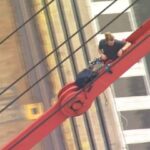“An Extraordinary Wave of Extreme Sentences” as the Coalition Stamps Out Dissent

Andrew George ran onto the field at Sydney’s Pointsbet Stadium during a Sharks versus the Tigers football match on 10 April. Wearing a cape emblazoned with Fireproof Australia and carrying a flare, his aim was to draw attention to the climate crisis and government inaction around it.
Back in the day, it was an Aussie tradition for streakers to run onto the footy field or the cricket pitch during a match. A police officer would then cover the naked person’s nether regions with their hat, and they’d be taken away, to receive a slap on the wrist. And the crowd loved it.
But George is now serving 3 months, after being sentenced to prison at Sutherland Local Court the following day, with bail denied. The difference in the treatment of the 32-year-old engineer and the old-time streaker is the government is trying to stamp out the political message George is making.
The treatment of the activist is part of a pattern. A fortnight prior, Blockade Australia’s Max Curmi was sentenced to 4 months prison, bail denied, for a nonviolent direct action at Port Botany, while Blockade’s Sergeio Herbert was sentenced to 12 months for an action in Newcastle last November.
And if this harsh penalisation of climate defenders doesn’t ring alarm bells, then the anti-protest laws the Perrottet government jammed through parliament on 1 April in direct response to these group’s actions should, as they’ve effectively extinguished the right to meaningfully protest.
“Daring to walk on the hallowed turf”
“I’ve had multiple criminal clients, and not once have I walked into a courtroom on the first day after they’ve been arrested, and seen them sentenced and sent to gaol immediately,” said Sydney lawyer Mark Davis, who’s representing George. “It never happens.”
“You’re arrested. You’re taken to court. If you wish to enter your plea, then you can,” he continued. “But you’re not sentenced for a long time, because you need time to prepare – even if they’re putting a guilty plea in – you need time to prepare their subjective material.”
When it came to George’s case, it’s quite obvious the political message he was putting across resulted in the application of this new and growing approach to silencing dissent via the immediate incarceration of climate defenders.
And this change in dealing with such activists has resulted in a situation where protesters, with good intent, are now being dealt with more harshly than those we would normally consider true criminals: fraudsters and thieves. Indeed, it’s a lot more difficult to get those types of offenders behind bars.
“There has actually been an extraordinary wave of extreme sentences being given to protesters across NSW,” Davis further told Sydney Criminal Lawyers. “These types of sentences are off the scale of anything we’ve ever seen before.”
Criminalising protest
Davis is also representing the Blockade Australia duo Max Curmi and Sergeio Herbert.
Curmi stewed away in prison for two weeks after scaling a crane at Port Botany to disrupt the operations going on at the facility. Then Davis got him out on bail, and the activist will now be reappearing in court, with time to prepare his case, and hopefully receive a noncustodial sentence.
Herbert’s matter was different. He was convicted of disrupting a coal train at Newcastle Coal Port and received a community correction order (CCO). And when he returned to the protest site a week later, he was again arrested for having breached the terms of the order.
Magistrate Janine Lacy then sentenced him to 12 months prison time, with non-parole set at 6 months. “We had that overturned,” Davis added. “It has been sent back to the Local Court for resentencing. That happened about a month ago.”
“A boot stamping on a human face – forever”
Fireproof Australia and Blockade Australia have upped the ante when it comes to nonviolent direct actions related to the climate. The recent extended drought, the megafires and the unprecedented floods have all spurred them on, especially as government continues to expand fossil fuel use.
And after one of the climate actions made NSW roads minister Natalie Ward late to work one morning, that was it, the Perrottet government couldn’t take it anymore. So, Ward and attorney general Mark Speakman drafted some of the most draconian anti-protest laws in the western world.
So, these days, if a protest that hasn’t been preapproved by NSW police obstructs a bridge, a tunnel, a major facility or even a road, the activists can be sentenced to up to 2 years prison time and/or a $22,000 fine.
And the authorities can work this to silence all types of dissent, not just defence of climate.
“We’ve already arrived at something that’s looking a bit dystopian,” Davis said in response to the laws. “We used to say that if we continue on this path, we’ll lose our essential rights in this society. But it’s already happened.”
The lawyer explained that the process of changing laws and increasing police powers “used to be a very slow path”. Yet, now, there’s a new “generation of parliamentarians” that have come to realise that they can simply enact extreme laws “on a whim” and they’re increasingly doing just that.
“So, all of the things we believed that we had as essential rights as Australians, are rapidly being ripped away from us by a late-night sitting in parliament,” he underscored.
Annihilating the public sphere
Protest has always been considered an essential part of a liberal democracy. But so have elected officials that work for and respond to the wants of the constituency, which is another aspect of this political system that’s now also missing in action.
“Protesters are a minority. That’s until it’s an issue that you believe in,” Davis continued. “And when you believe in it, that’s when you see how strong the NSW Police Force is. The extraordinary powers they have to stop, search and arrest. The extraordinary resources they have to surveil you.”
Section 144G of the Roads Act 1993 (NSW) now stipulates that “a person must not enter, remain on, climb, jump from or otherwise trespass on any… major bridge, tunnel or road if that conduct… seriously disrupts or obstructs vehicles or pedestrians attempting to use the bridge, tunnel or road.”
“Your ability to stand on the street and protest has now been removed, and even though they say the courts would never impose gaol on people daring to walk on the road, well, we’re seeing that right now,” Davis said in conclusion.
“It says two years. And the court will consider that. Whether it’s a serious infraction or not, it’s now in the hands of the courts to do so. I find it sickening.”








